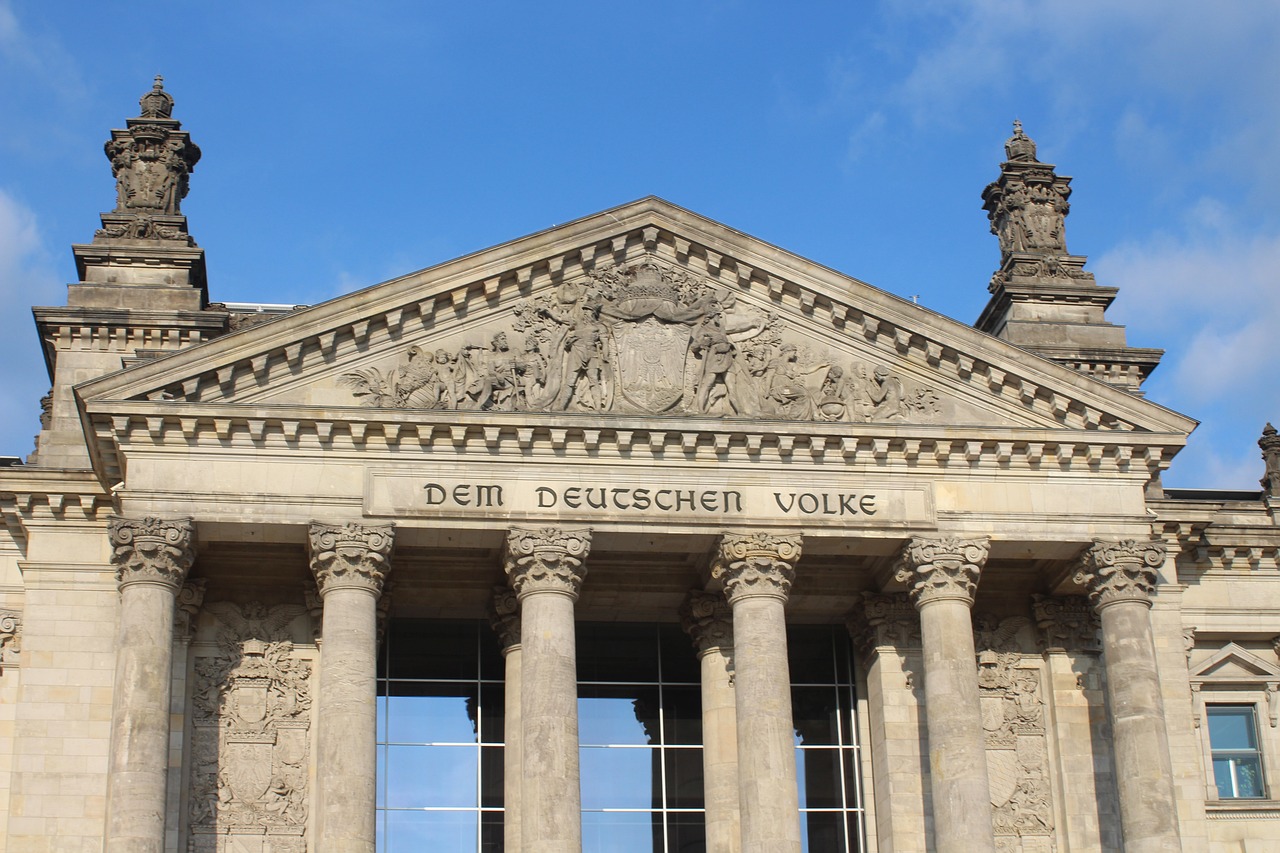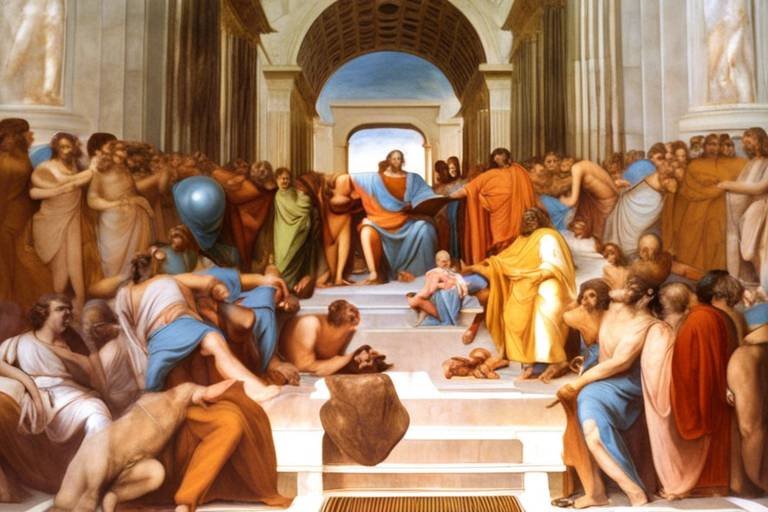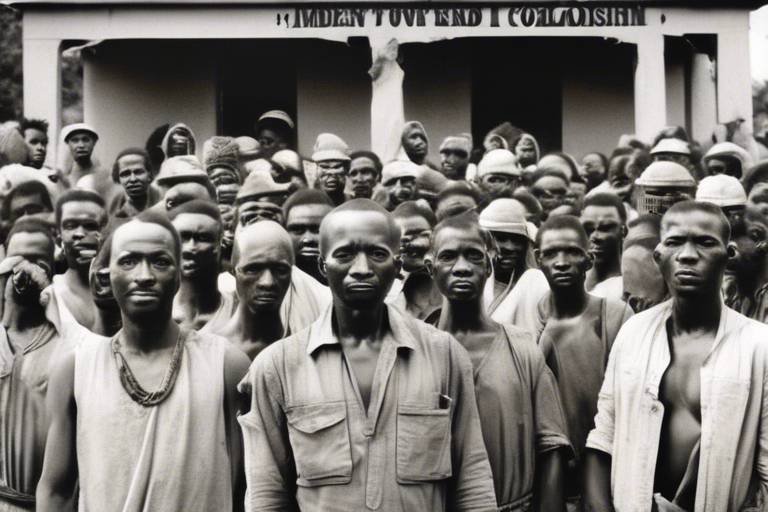How Does Political Philosophy Impact International Relations?
The intricate relationship between political philosophy and international relations is like a dance—each step influences the other, creating a complex choreography that shapes our global landscape. At its core, political philosophy provides the foundational ideas and frameworks that guide how nations interact, negotiate, and resolve conflicts. Just as a musician relies on scales and notes to create a melody, diplomats and political leaders depend on these philosophical principles to navigate the often tumultuous waters of global politics.
To truly understand this impact, we must delve into key concepts such as realism, liberalism, and constructivism. Each of these theories offers a distinct lens through which we can analyze state behavior and international interactions. For instance, realism focuses on the harsh realities of power dynamics and national interests, often leading to competition and conflict. On the other hand, liberalism emphasizes cooperation and the potential for peaceful coexistence through international institutions, while constructivism highlights the importance of social constructs, identities, and norms in shaping diplomatic relations.
As we explore these theories, we can see how they not only inform foreign policy decisions but also influence the broader discourse surrounding global issues such as human rights, globalization, and international justice. The philosophical underpinnings of these concepts guide the actions of states and international organizations, ultimately affecting how we address pressing challenges like climate change, terrorism, and humanitarian crises.
In a world that is increasingly interconnected, understanding the impact of political philosophy on international relations is more crucial than ever. It allows us to grasp the motivations behind state actions, the significance of diplomatic strategies, and the potential for cooperation or conflict. By examining these philosophical foundations, we can better navigate the complexities of global politics and work towards a more peaceful and just world.
- What is political philosophy? Political philosophy is the study of fundamental questions about government, justice, rights, and the role of individuals in society.
- How does realism differ from liberalism? Realism focuses on power and national interest, often leading to conflict, while liberalism advocates for cooperation and the role of international institutions in promoting peace.
- What is constructivism in international relations? Constructivism emphasizes the social construction of international relations, highlighting how identities, norms, and values shape state behavior.
- Why is understanding political philosophy important for global issues? It helps us comprehend the motivations behind state actions and the philosophical principles that guide responses to challenges like climate change and human rights.

Theoretical Foundations of Political Philosophy
Political philosophy serves as the backbone of international relations, offering a framework through which we can understand the complexities of global interactions. At its core, political philosophy seeks to answer fundamental questions about power, governance, and the role of individuals within society. By examining key theories such as realism, liberalism, and constructivism, we can gain valuable insights into how these ideas shape state behavior and influence diplomatic strategies.
Realism posits that the international arena is anarchic and that states are primarily motivated by self-interest and the pursuit of power. This perspective emphasizes the importance of military strength and national security, often leading to a competitive environment where states prioritize their survival above all else. Think of it as a high-stakes game of chess where each player is constantly strategizing to outmaneuver their opponents, often leading to conflict.
On the other hand, liberalism offers a more optimistic outlook, advocating for cooperation, democracy, and the establishment of international institutions. This theory suggests that states can work together to tackle global challenges, much like a team of superheroes joining forces to save the world. Liberal theorists argue that through diplomacy, trade, and international law, nations can create a more peaceful and interconnected global community.
Finally, we have constructivism, which shifts our focus from mere power dynamics to the social constructs that shape international relations. This theory emphasizes the importance of identity, norms, and values, suggesting that how states perceive themselves and each other can significantly influence their behavior. Imagine a group of friends: their interactions are not just based on what they can gain from one another but also on shared values and mutual respect.
In summary, the theoretical foundations of political philosophy provide a rich tapestry of ideas that help us understand the motivations behind state actions on the global stage. By exploring these theories, we can better grasp the intricate dance of diplomacy and conflict that defines international relations.
- What is the main focus of political philosophy?
Political philosophy primarily examines questions related to power, governance, and the role of individuals in society, providing insights into state behavior and international relations. - How do realism, liberalism, and constructivism differ?
Realism focuses on power and national interest, liberalism advocates for cooperation and international institutions, while constructivism emphasizes social constructs and identities in shaping state behavior. - Why is understanding political philosophy important for international relations?
Understanding political philosophy helps us analyze and interpret the motivations behind state actions, enabling us to navigate the complexities of global politics more effectively.

Realism and Its Implications
Realism, at its core, is a lens through which we can examine the complex and often turbulent waters of international relations. This theory posits that the **primary concern of states** is their own survival and security, leading to a world where power dynamics and national interests reign supreme. In this view, the international arena is akin to a competitive chess game, where each player is focused on outmaneuvering the other to secure their position. The implications of this perspective are profound and multifaceted, influencing everything from diplomatic strategies to military engagements.
At the heart of realism lies the belief that states are rational actors, driven by the **pursuit of power**. This pursuit often leads to a prioritization of military capabilities and strategic alliances. For instance, countries may engage in arms races or form coalitions to counter perceived threats. The realist perspective suggests that such actions are not merely reactions to immediate dangers but rather calculated moves in a larger game of survival. This focus on power and security can often lead to a **vicious cycle of conflict**, where the actions taken for defense can provoke further aggression from other states.
Moreover, realism emphasizes the anarchic nature of the international system, which lacks a central authority to enforce rules or norms. This absence of a governing body means that states must rely on their own capabilities to ensure their safety. As a result, the realist approach often leads to a **self-help** mentality, where cooperation is viewed with skepticism. States may engage in alliances, but these are often temporary and based on mutual interests rather than long-term commitments. The realist view thus paints a rather bleak picture of international relations, where trust is scarce and competition is the norm.
To illustrate the implications of realism, consider the following table that outlines key aspects of this theory:
| Aspect | Description |
|---|---|
| Power | Central to realism; states seek to maximize their power to ensure survival. |
| Anarchy | The international system is anarchic, lacking a central authority. |
| Self-Help | States must rely on their own resources and capabilities for security. |
| Conflict | Competition and conflict are inherent in international relations. |
Realism's implications extend beyond mere theory; they manifest in the policies and actions of states on the global stage. For example, the **Cold War** exemplified a period where realist principles dominated international relations, with the United States and the Soviet Union engaged in a tense standoff characterized by military build-up and strategic alliances. This era underscored the realist belief that security dilemmas could lead to an arms race, as each superpower sought to deter the other from aggression.
However, realism is not without its criticisms. Detractors argue that its narrow focus on power politics often overlooks the importance of **cooperation** and **diplomacy**. Critics contend that while realism provides a robust framework for understanding conflict, it fails to account for the ways in which states can work together to achieve common goals. This is particularly relevant in today's world, where global challenges such as climate change and terrorism require collaborative approaches rather than unilateral actions.
In conclusion, realism significantly shapes our understanding of international relations by prioritizing state security and the pursuit of power. While it offers valuable insights into the motivations behind state behavior, it is essential to recognize its limitations and consider the broader context of global interdependence. As we navigate the complexities of international politics, the balance between realism and other theories like liberalism and constructivism will continue to play a crucial role in shaping our world.
- What is realism in international relations? Realism is a theory that emphasizes the role of power and national interest in shaping state behavior in an anarchic international system.
- Who are the key thinkers associated with realism? Notable realist thinkers include Niccolò Machiavelli and Thomas Hobbes, who laid the groundwork for understanding power dynamics in politics.
- How does realism impact foreign policy? Realist principles guide foreign policy by emphasizing military preparedness, strategic alliances, and a focus on national security.
- What are the critiques of realism? Critics argue that realism overlooks the importance of cooperation, ethics, and the role of international institutions in promoting peace.

Key Realist Thinkers
When diving into the world of realism in political philosophy, we can't overlook the profound contributions of key thinkers who have shaped its foundations. These intellectual giants, such as Machiavelli and Hobbes, provide critical insights into the nature of power and human behavior, which are essential for understanding international relations today. Machiavelli, often considered the father of modern political theory, emphasized the importance of pragmatic governance over moralistic ideals. His famous work, The Prince, illustrates that, in the pursuit of power, the ends often justify the means. This perspective resonates deeply in the realm of international relations, where states frequently prioritize national interest and security above all else.
Similarly, Thomas Hobbes offered a grim view of human nature in his seminal work, Leviathan. He posited that in a state of nature, life would be "solitary, poor, nasty, brutish, and short," which underscores the necessity for a strong central authority to maintain order and prevent chaos. Hobbes' ideas suggest that without a governing body, individuals would act in their own self-interest, leading to conflict and insecurity. This notion of an anarchic international system, where states act primarily out of self-preservation, is a cornerstone of realist thought.
As we explore the contributions of these thinkers, it’s crucial to recognize how their theories apply to contemporary global politics. Realism, grounded in the belief that power dynamics and national interests drive state behavior, continues to influence how nations interact on the world stage. For instance, the ongoing power struggles among major countries often echo Machiavellian principles, where strategic alliances and military readiness are paramount.
In addition to Machiavelli and Hobbes, other notable realist theorists include Hans Morgenthau and Kenneth Waltz. Morgenthau’s work, particularly Politics Among Nations, further developed realist principles by introducing the concept of the balance of power, which posits that national security is enhanced when military capabilities are distributed among various states. Waltz, on the other hand, introduced structural realism, focusing on how the international system's structure influences state behavior. His ideas help us understand why states behave the way they do in a competitive environment.
To summarize, the key realist thinkers have laid the groundwork for understanding international relations through the lens of power and self-interest. Their contributions highlight the complexities of state interactions, providing a framework that continues to resonate in today’s geopolitical landscape. As we navigate the intricacies of global politics, reflecting on their insights can illuminate the motivations behind state actions and the underlying dynamics that shape our world.
- What is realism in political philosophy?
Realism is a theoretical perspective that emphasizes the role of power and national interest in international relations, often prioritizing state security and survival. - Who are the key thinkers associated with realism?
Key thinkers include Machiavelli, Hobbes, Hans Morgenthau, and Kenneth Waltz, each contributing essential ideas that shape realist thought. - How does realism influence foreign policy?
Realism guides foreign policy by emphasizing military readiness, strategic alliances, and the importance of national interests in decision-making. - What are the critiques of realism?
Critics argue that realism overlooks ethical considerations, cooperation, and the role of international institutions in promoting peace.

Realism in Modern Context
In today's rapidly evolving geopolitical landscape, realism remains a crucial lens through which we can understand the dynamics of international relations. The principles of realism, which prioritize state security and the pursuit of national interests, are more relevant than ever as nations navigate complex power struggles on the global stage. The resurgence of great power competition, particularly among the United States, China, and Russia, exemplifies how realist thought influences contemporary foreign policy decisions.
Realism asserts that the international system is anarchic, meaning there is no overarching authority to regulate state behavior. This leads to a world where countries must rely on their own capabilities to ensure survival and security. For instance, as nations face threats from terrorism, cyber warfare, and military aggression, they often resort to strengthening their military capabilities and forming strategic alliances. This behavior reflects the realist view that in an uncertain world, power is the ultimate currency.
Moreover, the realist perspective sheds light on the motivations behind military interventions and foreign policy decisions. Take, for example, the U.S. involvement in the Middle East. Many argue that the actions taken were driven by a desire to secure resources and maintain regional influence rather than purely humanitarian motives. This perspective emphasizes the idea that states act primarily out of self-interest, often leading to conflicts that can escalate into larger confrontations.
To illustrate the ongoing relevance of realism, we can observe several key trends in modern international relations:
- Military Buildup: Nations are increasingly investing in their military capabilities, reflecting a realist approach to national security.
- Strategic Alliances: Countries are forming alliances based on shared interests, such as the North Atlantic Treaty Organization (NATO) and various bilateral agreements.
- Power Dynamics: The shifting balance of power, particularly with the rise of China as a global superpower, is reshaping international relations.
However, while realism offers valuable insights, it is not without its criticisms. Detractors argue that an exclusive focus on power politics can lead to a neglect of ethical considerations and the potential for cooperation. This raises the question: can realism coexist with the ideals of cooperation and diplomacy? The answer may lie in the recognition that while states often prioritize national interests, there are opportunities for collaboration that can enhance security for all parties involved.
In summary, the modern context of realism highlights its enduring relevance in understanding international relations. As the world becomes increasingly interconnected yet fraught with competition, the realist framework provides a critical lens through which to analyze state behavior, power dynamics, and the ongoing quest for security in an unpredictable environment.
- What is realism in international relations?
Realism is a theoretical perspective that emphasizes the role of power and national interest in shaping state behavior and international interactions. - How does realism differ from liberalism?
While realism focuses on competition and conflict, liberalism advocates for cooperation, democracy, and the role of international institutions. - Who are some key thinkers associated with realism?
Notable realist thinkers include Niccolò Machiavelli, Thomas Hobbes, and Hans Morgenthau, each contributing to the development of realist thought. - What are some criticisms of realism?
Critics argue that realism overlooks ethical considerations, the potential for cooperation, and the importance of international institutions in promoting peace.

Critiques of Realism
Realism, while a dominant theory in international relations, faces significant critiques that challenge its foundational assumptions and implications. Critics argue that the theory's narrow focus on power and national interest often overlooks the complex realities of global politics. For instance, realism tends to portray states as rational actors solely motivated by self-interest, neglecting the influence of ethical considerations and humanitarian concerns. This raises the question: can a world governed by power politics truly address the pressing issues of our time, such as climate change, poverty, and human rights abuses?
Moreover, the realist perspective often dismisses the role of international institutions and cooperation. Critics contend that organizations like the United Nations and treaties such as the Paris Agreement play crucial roles in promoting peace and stability. By focusing primarily on state security and competition, realism risks underestimating the potential for collaborative solutions to global challenges. In a world increasingly interconnected through trade and communication, the idea that states can operate in isolation becomes increasingly untenable.
Another significant critique of realism is its deterministic view of human nature. Realists often argue that humans are inherently power-seeking and aggressive, a notion that can lead to a self-fulfilling prophecy. This perspective can perpetuate a cycle of conflict, where states feel compelled to act aggressively to secure their interests. However, many scholars argue that human behavior is not solely driven by power dynamics; rather, it is shaped by a myriad of factors, including culture, ideology, and social norms. This opens up the possibility for alternative approaches to international relations that prioritize diplomacy and cooperation over competition.
Furthermore, the realist emphasis on military power and deterrence often leads to an arms race among nations. This not only increases the likelihood of conflict but also diverts resources away from pressing social issues such as education and healthcare. The opportunity cost of maintaining a strong military presence can be significant, especially when considering the potential benefits of investing in international development and humanitarian aid. In this light, realism may inadvertently contribute to global instability rather than fostering a peaceful international order.
In summary, while realism provides valuable insights into the nature of international relations, its critiques highlight the need for a more nuanced understanding of global politics. By acknowledging the importance of ethics, cooperation, and the diverse motivations behind state behavior, we can develop a more comprehensive framework for addressing the complex challenges of our time. The ongoing debates between realism and its critics underscore the dynamic nature of international relations, reminding us that no single theory can fully capture the intricacies of global interactions.
- What is realism in international relations? Realism is a theoretical perspective that emphasizes the role of power, national interest, and state security in shaping international politics.
- Who are some key thinkers associated with realism? Prominent realist thinkers include Niccolò Machiavelli, Thomas Hobbes, and Hans Morgenthau.
- What are the main critiques of realism? Critics argue that realism overlooks ethical considerations, the role of international institutions, and the complexities of human behavior, leading to a narrow understanding of global politics.
- How does realism impact foreign policy? Realist principles often guide foreign policy decisions, prioritizing military readiness and strategic alliances to ensure national security.

Applications of Realism in Foreign Policy
The application of realism in foreign policy is akin to a chess game, where each move is calculated with the utmost precision, prioritizing national interest and security above all else. In the arena of international relations, realist principles guide decision-makers in crafting strategies that ensure the survival and prosperity of their states. This approach often manifests in several key areas:
Firstly, strategic alliances play a crucial role in realism. States frequently forge partnerships based on mutual interests, often driven by the necessity to counterbalance more powerful adversaries. For instance, during the Cold War, NATO was established as a collective defense mechanism against the Soviet Union, illustrating how states come together to enhance their security.
Moreover, military readiness is another pillar of realist foreign policy. Nations invest heavily in their armed forces, not merely for defense but to project power and deter potential aggressors. This can lead to an arms race, where countries continuously seek to outdo one another in military capabilities, as seen in the ongoing tensions in regions like the South China Sea.
Realism also emphasizes the importance of deterrence. The concept revolves around preventing adversaries from taking hostile actions by showcasing military strength or readiness to respond decisively. The doctrine of mutually assured destruction (MAD) during the nuclear arms race exemplifies this principle, where the threat of catastrophic retaliation was intended to maintain peace through fear.
Furthermore, realist foreign policy often leads to a pragmatic approach to international relations, where ethical considerations take a backseat to strategic interests. This can be seen in how states engage with authoritarian regimes or turn a blind eye to human rights violations if it serves their national interest. For example, countries may maintain close ties with oil-rich nations despite their poor human rights records, prioritizing energy security over moral obligations.
In summary, the applications of realism in foreign policy are multifaceted, focusing on strategic alliances, military readiness, deterrence, and a pragmatic approach to international relations. These elements work together to shape the global landscape, often leading to a competitive and sometimes contentious international environment.
- What is realism in international relations? Realism is a theoretical perspective that emphasizes the role of power and national interest in shaping state behavior and international politics.
- How does realism influence foreign policy? Realism influences foreign policy by prioritizing national security, strategic alliances, and military readiness over ethical considerations.
- Can realism lead to conflict? Yes, the competitive nature of realism often leads to conflicts as states prioritize their interests, which can result in power struggles and military confrontations.
- What are some criticisms of realism? Critics argue that realism overlooks the importance of cooperation, ethics, and the role of international institutions in promoting peace.

Liberalism and Global Cooperation
Liberalism, at its core, is a philosophy that champions cooperation, democracy, and the importance of international institutions. It presents a vision of a world where states are not merely competing for power, but are instead working together to tackle the pressing challenges that transcend borders. Imagine a neighborhood where everyone collaborates to keep the community safe and thriving; this is the essence of liberalism in the international arena. By promoting dialogue and mutual understanding, liberalism seeks to create a more interconnected world, where nations can unite to address global issues like climate change and terrorism.
One of the most significant aspects of liberalism is its belief in the power of international law and organizations. The works of influential theorists such as Kant and Wilson have underscored the importance of these frameworks in fostering peace and cooperation. They argue that through established laws and institutions, states can manage their interactions more effectively, reducing the likelihood of conflict. Think of it like a game with rules; when everyone plays by the rules, the game is more enjoyable and fair for all involved. In this sense, international organizations like the United Nations play a crucial role, acting as platforms for dialogue and cooperation among nations.
However, the liberal perspective is not without its challenges. The rise of nationalism and authoritarianism in various parts of the world has raised questions about the effectiveness of liberalism in promoting global governance and stability. As more countries prioritize their own interests over collective action, the liberal vision of a cooperative international community faces significant obstacles. It's akin to a team where some players refuse to pass the ball; without cooperation, achieving a common goal becomes increasingly difficult. This situation calls for a reevaluation of how liberalism can adapt to a changing global landscape while still advocating for cooperation and mutual benefit.
In conclusion, while liberalism presents a hopeful framework for international relations, its practical application is often complicated by real-world dynamics. The philosophy encourages states to see beyond their immediate interests and consider the broader implications of their actions on global cooperation. As we navigate this complex landscape, the challenge remains: how can we foster a spirit of collaboration in a world that sometimes seems bent on division?
- What is liberalism in international relations? Liberalism is a political philosophy that emphasizes cooperation, democracy, and the role of international institutions in fostering peace and collaboration among states.
- How does liberalism address global challenges? Liberalism advocates for collective action among states to tackle issues such as climate change, terrorism, and economic stability, promoting dialogue and mutual understanding.
- What are the main criticisms of liberalism? Critics argue that liberalism can be overly idealistic, often overlooking the realities of nationalism and authoritarianism that can hinder international cooperation.

Influential Liberal Theorists
The realm of liberalism in political philosophy is profoundly shaped by the contributions of several key thinkers whose ideas have laid the groundwork for modern international relations. At the forefront, we find Immanuel Kant, a philosopher whose vision of perpetual peace has inspired countless debates on international cooperation. Kant argued that a federation of free states, governed by laws and mutual respect, could lead to lasting peace. This idea resonates strongly today, especially as nations grapple with issues that transcend borders, such as climate change and human rights. Kant’s emphasis on the importance of democratic governance and the rule of law remains a cornerstone of liberal thought, advocating for a world where democratic states are less likely to go to war with each other.
Another significant figure in liberal thought is Woodrow Wilson, the 28th President of the United States. Wilson's vision of international relations was heavily influenced by his belief in self-determination and the establishment of international organizations. His advocacy for the League of Nations after World War I was a pioneering step towards institutionalizing global governance, aiming to prevent future conflicts through dialogue and cooperation. Wilson’s ideas laid the foundation for contemporary institutions like the United Nations, which strive to maintain peace and security around the globe.
In addition to Kant and Wilson, we cannot overlook the contributions of John Stuart Mill, whose ideas on liberty and individual rights have had a profound impact on the liberal tradition. Mill argued that the protection of individual freedoms is essential for a just society, and this principle extends to international relations, where the rights of individuals should be prioritized over the interests of states. His work encourages a focus on human rights within the framework of international law, challenging states to uphold the dignity and freedoms of all individuals.
These theorists collectively underscore the liberal perspective that emphasizes the potential for cooperation and collective action among states. Their ideas illustrate how international institutions, democratic governance, and the protection of individual rights can foster a more peaceful and cooperative global environment. However, while these theories provide a hopeful outlook, they also face significant challenges in today’s world, where nationalism and authoritarianism are on the rise. Understanding the contributions of these thinkers is crucial in navigating the complexities of modern international relations.
In summary, the ideas of influential liberal theorists like Kant, Wilson, and Mill continue to shape our understanding of international relations. Their emphasis on democracy, cooperation, and human rights provides a framework for addressing contemporary global challenges, reminding us of the importance of collaboration in an increasingly interconnected world.
- What is the main idea of liberalism in international relations?
Liberalism focuses on cooperation, democracy, and the role of international institutions to promote peace and resolve conflicts. - Who are some key liberal theorists?
Immanuel Kant, Woodrow Wilson, and John Stuart Mill are prominent figures in liberal political philosophy. - How does liberalism address global challenges?
Liberalism advocates for collective action and international cooperation to tackle issues like climate change, terrorism, and human rights violations.

Challenges to Liberalism
Liberalism, with its optimistic vision for global cooperation and peace, faces a myriad of challenges in today's complex world. While the ideology promotes democracy, human rights, and the importance of international institutions, the rise of nationalism and authoritarian regimes poses significant hurdles. These challenges not only test the resilience of liberal principles but also raise questions about their applicability in a world increasingly characterized by division and conflict.
One of the most pressing challenges to liberalism is the resurgence of nationalism. In many countries, leaders are embracing nationalist rhetoric that prioritizes national interests over global cooperation. This shift can be seen in various regions, where the focus on sovereignty has led to skepticism toward international agreements and organizations that were once seen as vital for fostering global collaboration. For instance, the withdrawal of certain nations from multinational agreements, such as the Paris Climate Accord, highlights a growing trend of isolationism that undermines the liberal agenda.
Additionally, the rise of authoritarianism complicates the liberal narrative. Countries that once championed democratic values are now witnessing a drift towards autocratic governance. This shift not only threatens the internal stability of these nations but also their relationships with other states. The challenge lies in reconciling the liberal ideals of democracy and human rights with the reality of governments that suppress dissent and curtail freedoms. As these regimes gain influence, the liberal framework struggles to assert its relevance in addressing issues of governance and human rights.
Moreover, the impact of globalization has brought about its own set of challenges. While liberalism advocates for interconnectedness and cooperation, globalization has also led to significant economic disparities and cultural tensions. Many individuals feel left behind by the rapid pace of change, which fuels resentment and a backlash against liberal policies. This phenomenon can be observed in various movements across the globe, where disillusionment with globalization has led to calls for protectionist measures and a retreat from liberal economic principles.
In light of these challenges, it is essential to recognize that liberalism is not monolithic. There are various strands of liberal thought that seek to adapt to the changing landscape. Some theorists argue for a more pragmatic approach that considers the realities of power dynamics while still advocating for cooperation and dialogue. Others emphasize the importance of strengthening international institutions to effectively address global challenges, such as climate change and terrorism, which require collective action.
Ultimately, the future of liberalism hinges on its ability to evolve and respond to these challenges. It must find ways to engage with the realities of nationalism and authoritarianism while reaffirming its commitment to democratic values and human rights. The ongoing debate surrounding these issues will shape not only the trajectory of liberalism but also the broader landscape of international relations in the years to come.
- What is liberalism in international relations? Liberalism is a political philosophy that emphasizes cooperation, democracy, and the role of international institutions in fostering peace and stability among nations.
- What are the main challenges to liberalism today? The main challenges include the rise of nationalism, authoritarian regimes, and the negative aspects of globalization that lead to economic disparities and cultural tensions.
- How does nationalism affect global cooperation? Nationalism often prioritizes national interests over global collaboration, leading to skepticism towards international agreements and a retreat from cooperative efforts.
- Can liberalism adapt to current global challenges? Yes, many theorists advocate for a more pragmatic approach within liberalism that acknowledges power dynamics while still promoting democratic values and international cooperation.

Constructivism and Social Dynamics
Constructivism is a fascinating lens through which we can view international relations, emphasizing that the world is not just shaped by material factors such as military power or economic resources, but also by social dynamics. This approach posits that our understanding of international politics is constructed through social interactions, shared beliefs, and collective identities. Imagine a tapestry woven from countless threads of culture, history, and relationships; that's how constructivists see the world of diplomacy and international engagement.
At the heart of constructivism lies the idea that identity plays a crucial role in shaping a nation's foreign policy. For instance, the way a country perceives itself—its values, beliefs, and historical experiences—can significantly influence its interactions with other states. This is particularly evident in how nations respond to global challenges like human rights violations or climate change. A country that identifies strongly with humanitarian values may take a more interventionist approach, advocating for action in response to crises, while another that prioritizes sovereignty may adopt a more isolationist stance.
Moreover, norms are another critical aspect of constructivism. These unwritten rules and expectations guide state behavior and help establish what is considered acceptable or unacceptable in international relations. For example, the norm against the use of chemical weapons has shaped global responses to conflicts where such weapons are employed. When a nation violates these norms, it often faces international backlash, illustrating how social constructs can have real-world consequences.
To further illustrate the impact of identity and norms, consider the following table:
| Aspect | Constructivist View | Realist View |
|---|---|---|
| Identity | Shapes foreign policy and international interactions | Focuses on power and national interests |
| Norms | Guide behavior and establish expectations | Often disregarded in favor of strategic advantages |
| International Issues | Addressed through social constructs and cooperation | Managed through competition and conflict |
This contrast highlights how constructivism provides a more nuanced understanding of international relations, taking into account the complexities of human behavior and societal influences. In a world that is increasingly interconnected, recognizing the role of social dynamics is essential for addressing global challenges effectively.
As we navigate the complexities of international politics, it's clear that constructivism offers valuable insights into how our perceptions and interactions shape the world stage. It encourages us to look beyond mere power struggles and consider the deeper social fabrics that bind nations together or drive them apart.
- What is constructivism in international relations? Constructivism is a theory that emphasizes the importance of social constructs, such as identity and norms, in shaping state behavior and international interactions.
- How does identity influence foreign policy? A country's identity, shaped by its values and history, significantly impacts its foreign policy decisions and interactions with other nations.
- What role do norms play in international relations? Norms act as unwritten rules that guide state behavior, establishing expectations for acceptable conduct in the international arena.

Identity and National Interests
The concept of identity plays a crucial role in shaping a nation's interests and its approach to international relations. This is because identity is not just about how a state perceives itself; it also encompasses how it is perceived by others. For instance, a country that identifies as a peace-loving democracy may prioritize diplomatic solutions over military interventions, while a nation that sees itself as a regional power might be more inclined to assert its influence through force. This interplay between identity and national interests creates a complex web of motivations that can lead to vastly different foreign policy decisions.
Moreover, national interests are often framed within the context of identity. States may prioritize certain issues based on their historical narratives, cultural values, and social norms. For example, a nation that prides itself on human rights may take a strong stance against authoritarian regimes, advocating for intervention in cases of human rights abuses. Conversely, a state that values sovereignty above all else may resist external pressures to change its policies, even if those policies conflict with widely accepted international norms.
To illustrate this relationship further, consider the following table, which highlights how different identities can influence national interests:
| National Identity | Foreign Policy Focus | Examples |
|---|---|---|
| Peace-oriented | Diplomatic solutions, conflict resolution | Sweden's mediation efforts in international conflicts |
| Regional Power | Influence over neighboring states, military presence | Russia's actions in Ukraine |
| Human Rights Advocate | Intervention in humanitarian crises | U.S. involvement in Libya |
| Sovereignty-focused | Non-interference in domestic affairs | China's stance on Taiwan |
In summary, understanding the connection between identity and national interests is essential for analyzing state behavior on the global stage. It provides insight into why countries may act in particular ways and how their self-perception drives their responses to international challenges. As the world becomes increasingly interconnected, recognizing these dynamics can help us navigate the complex landscape of international relations more effectively.
- How does national identity influence foreign policy?
National identity shapes a country's values and beliefs, which in turn guide its foreign policy decisions. For example, a nation that identifies with democratic ideals may prioritize human rights in its international relations. - Can a country's identity change over time?
Yes, national identity can evolve due to various factors such as social movements, political changes, or significant historical events, leading to shifts in foreign policy priorities. - What role do cultural values play in shaping national interests?
Cultural values are integral to national identity and influence how states perceive their interests, often guiding decisions related to diplomacy, trade, and military action.

The Role of Norms in International Relations
In the complex world of international relations, norms play a pivotal role in shaping how states interact with one another. Norms can be understood as the unwritten rules and expectations that govern behavior within the international system. They influence everything from diplomatic engagements to military actions, creating a framework within which states operate. These norms are not just arbitrary; they emerge from a variety of sources, including historical precedents, cultural values, and shared beliefs about appropriate conduct.
For instance, the norm of sovereignty dictates that states should respect each other's territorial integrity and political independence. This principle is foundational to international law and is crucial in maintaining global order. When a state violates this norm, as seen in various conflicts throughout history, it often leads to widespread condemnation and, in some cases, military intervention. The repercussions of such violations highlight how norms can act as both a guiding force and a mechanism for accountability in the international arena.
Moreover, norms can evolve over time, reflecting changes in the global landscape. For instance, the increasing emphasis on human rights in international relations has transformed how states approach issues of governance and humanitarian intervention. This shift illustrates how norms can adapt to new challenges and societal expectations. As states recognize the importance of human rights, they may feel pressured to align their domestic policies with international standards, thereby fostering a more cooperative global environment.
In addition to shaping state behavior, norms also influence the expectations of non-state actors, such as international organizations and NGOs. These entities often advocate for the adherence to specific norms, such as environmental protection or social justice, thereby amplifying their impact on global governance. The interplay between state and non-state actors in promoting norms can lead to significant shifts in policy and practice, demonstrating that norms are not merely theoretical constructs but dynamic elements of international relations.
To summarize, norms serve as essential tools in the toolkit of international relations. They guide the actions of states, foster cooperation, and help to establish accountability mechanisms. Understanding the role of norms is crucial for anyone looking to navigate the intricate web of global politics. As we continue to face pressing global challenges, the importance of norms in shaping diplomatic strategies and state behavior cannot be overstated.
- What are norms in international relations? Norms are the unwritten rules and expectations that guide the behavior of states and other actors in the international system.
- How do norms influence state behavior? Norms establish standards for acceptable conduct, which can lead to cooperation or conflict depending on whether states adhere to or violate these expectations.
- Can norms change over time? Yes, norms can evolve in response to shifts in global dynamics, societal values, and emerging challenges, reflecting the changing nature of international relations.
- What role do non-state actors play in promoting norms? Non-state actors, such as NGOs and international organizations, advocate for specific norms and can influence state behavior by holding them accountable to international standards.

The Impact of Political Philosophy on Global Issues
Political philosophy plays a crucial role in shaping how nations respond to global challenges. It acts as a lens through which states interpret their responsibilities and obligations to the international community. The debates surrounding issues like war, peace, human rights, and international justice are deeply rooted in philosophical thought. For instance, when discussing human rights, the philosophical underpinnings inform the legal frameworks that guide states in their obligations towards individuals and communities. This is not just a matter of law; it reflects a broader ethical commitment to uphold the dignity of every human being.
Moreover, political philosophy influences the way states perceive their role in a globalized world. As globalization continues to blur the lines between national borders, traditional political philosophies are being challenged. The rise of economic interdependence and cultural exchange prompts critical discussions about sovereignty and the responsibilities that come with being part of a global community. For example, states are increasingly faced with the dilemma of prioritizing national interests versus contributing to global governance. This tension often leads to varying approaches to international cooperation, particularly when addressing pressing issues like climate change and terrorism.
In this context, we can see how different philosophical frameworks lead to different policy outcomes. A state influenced by liberalism might advocate for international treaties and collaborative efforts to combat climate change, believing that collective action is essential for the survival of our planet. On the other hand, a state guided by realism may prioritize its own economic growth and security over international commitments, viewing global cooperation as secondary to national interests. This divergence in thought illustrates how deeply philosophical beliefs can shape practical decisions on the world stage.
The implications of these philosophical influences extend beyond mere policy decisions; they also affect the perception of legitimacy in international relations. When states act in accordance with widely accepted norms and values, they enhance their legitimacy and foster trust among nations. Conversely, when they disregard these principles, they risk isolation and conflict. This dynamic is particularly evident in discussions surrounding international justice, where the philosophical debates about fairness and equity can lead to significant geopolitical consequences.
To summarize, the impact of political philosophy on global issues is profound and multifaceted. It not only shapes the principles that guide state behavior but also influences the very fabric of international relations. As we navigate an increasingly complex global landscape, understanding these philosophical underpinnings becomes essential for fostering cooperation and addressing the challenges that confront us all.
- How does political philosophy influence foreign policy?
Political philosophy provides the foundational beliefs and values that guide a state's approach to international relations, affecting decisions on alliances, conflicts, and treaties. - What role do human rights play in political philosophy?
Human rights are often seen as a moral obligation within political philosophy, influencing international laws and norms that govern state behavior towards individuals. - Can political philosophy adapt to globalization?
Yes, political philosophy is constantly evolving to address the challenges posed by globalization, leading to new discussions about sovereignty, interdependence, and cultural exchange.

Human Rights and International Law
This article explores the intricate relationship between political philosophy and international relations, highlighting key concepts, theories, and their implications in shaping global politics and diplomatic strategies.
Understanding the core theories of political philosophy provides insight into how they influence international relations, including realism, liberalism, and constructivism, which shape state behavior and global interactions.
Realism emphasizes power and national interest, significantly impacting international relations by prioritizing state security and survival, often leading to conflict and competition among nations.
Prominent thinkers like Machiavelli and Hobbes laid the groundwork for realist thought, illustrating how human nature and state behavior drive international politics and conflict.
In contemporary international relations, realism continues to inform policies and strategies, particularly in power struggles and military engagements among major global players.
Critics argue that realism's focus on power politics overlooks important factors such as ethics, cooperation, and the role of international institutions in promoting peace.
Realist principles guide foreign policy decisions, emphasizing strategic alliances, deterrence, and military readiness as essential components of national security.
Liberalism advocates for cooperation, democracy, and international institutions, shaping a more interconnected world where states work together to address global challenges like climate change and terrorism.
The ideas of theorists like Kant and Wilson highlight the importance of international law and organizations in fostering peace and cooperation among nations.
Despite its optimistic view, liberalism faces challenges from rising nationalism and authoritarianism, questioning its effectiveness in promoting global governance and stability.
Constructivism focuses on the social construction of international relations, emphasizing the role of identity, norms, and values in shaping state behavior and global interactions.
Understanding how national identity influences foreign policy decisions helps explain varying approaches to international issues, from human rights to military intervention.
Norms guide state behavior and expectations, impacting how countries engage with one another in diplomatic, economic, and military contexts.
Political philosophy significantly shapes responses to global issues, influencing debates on war, peace, human rights, and international justice, ultimately affecting global governance and cooperation.
The philosophical foundations of human rights have become pivotal in shaping international law, guiding states in their obligations towards individuals and communities. Central to this discourse is the belief that all humans possess inherent rights, which must be respected and protected regardless of nationality, ethnicity, or political affiliation. This idea isn't just a lofty ideal; it's enshrined in various international legal frameworks, such as the Universal Declaration of Human Rights (UDHR), which serves as a cornerstone for human rights law globally.
Moreover, international treaties and conventions, like the International Covenant on Civil and Political Rights (ICCPR) and the Convention on the Rights of the Child (CRC), provide specific guidelines that nations are expected to uphold. These documents reflect a collective commitment to ensuring that basic human rights are not merely theoretical concepts but practical realities. For instance, the adherence to these treaties can be seen as a litmus test for a country's commitment to human rights.
However, the implementation of these laws often encounters challenges. Some countries may sign treaties but fail to enforce them adequately, leading to a gap between international obligations and domestic practices. This discrepancy raises critical questions: How can the international community hold states accountable? What mechanisms exist to ensure compliance, and how effective are they?
In this context, various international institutions play a crucial role. Organizations like the United Nations (UN) and the International Criminal Court (ICC) are tasked with monitoring human rights violations and promoting accountability. Through mechanisms such as sanctions, diplomatic pressure, and, in extreme cases, military intervention, these institutions strive to uphold international law and protect human rights.
Ultimately, the interplay between political philosophy and international law is complex and multifaceted. It challenges us to consider not just the legal frameworks in place but also the ethical implications of our actions on the global stage. As we navigate the murky waters of international relations, we must ask ourselves: Are we truly committed to upholding human rights for all, or are we merely paying lip service to these ideals?
- What is the relationship between political philosophy and international relations?
Political philosophy provides the theoretical frameworks that help us understand state behavior and the dynamics of global interactions. - How do human rights influence international law?
Human rights serve as a foundational principle in international law, guiding states in their obligations towards individuals and communities. - What role do international institutions play in enforcing human rights?
International institutions like the UN and ICC monitor human rights violations and promote accountability through various mechanisms. - Why is it challenging to implement international human rights laws?
Challenges arise from discrepancies between a country’s international commitments and its domestic practices, often leading to inadequate enforcement.

Globalization and Political Philosophy
Globalization is not just a buzzword; it’s a phenomenon that has reshaped the very fabric of international relations and political philosophy. As the world becomes increasingly interconnected, the traditional notions of sovereignty, statehood, and national identity are being challenged. Think about it: in a world where information travels at the speed of light and economies are intertwined, how do we define borders? This question is at the heart of the discourse on globalization and its impact on political philosophy.
One of the most profound implications of globalization is the shift in how we perceive sovereignty. In the past, the concept of sovereignty was about absolute control over a defined territory. However, with the rise of global networks and transnational issues, such as climate change and terrorism, states find themselves navigating a complex web of obligations that extend beyond their borders. For instance, consider how environmental policies in one country can significantly affect global climate patterns. This interdependence calls for a rethinking of traditional political philosophies that prioritize state interests over collective global welfare.
Moreover, globalization fosters a dialogue between different political philosophies, leading to a rich tapestry of ideas that can enhance our understanding of international relations. For example, the liberal perspective advocates for cooperation and international institutions, arguing that states can achieve more by working together than by acting alone. In contrast, realism, with its focus on power dynamics, often views globalization with skepticism, fearing that it may dilute national interests. This clash of ideas is crucial as it shapes policies that address global challenges.
The role of cultural exchange in globalization cannot be overlooked either. As cultures intermingle, they bring with them diverse political philosophies and ideologies. This interaction can lead to a more nuanced understanding of governance and human rights, as different societies share their experiences and values. However, it can also lead to tensions, especially when dominant cultures impose their values on others. This raises critical questions about cultural imperialism and the ethics of intervention. Are we promoting global welfare, or are we infringing on the sovereignty and identity of nations?
Additionally, globalization poses significant challenges to political philosophy by questioning the effectiveness of traditional frameworks in addressing contemporary issues. For instance, the rise of populism and nationalism in response to globalization reflects a backlash against perceived threats to national identity and economic security. This phenomenon highlights the need for political philosophers to adapt their theories to better understand and respond to the realities of a globalized world.
In conclusion, the intersection of globalization and political philosophy is a dynamic and evolving field that requires ongoing exploration. As we navigate this complex landscape, it’s essential to consider how our philosophical underpinnings can inform our responses to global challenges. By embracing a more interconnected approach, we can foster cooperation and understanding among nations, ultimately leading to a more just and equitable world.
- What is globalization? Globalization refers to the increasing interconnectedness of countries through trade, communication, and cultural exchange.
- How does globalization affect national sovereignty? Globalization challenges traditional notions of sovereignty by creating interdependencies that require cooperation beyond national borders.
- What role does political philosophy play in understanding globalization? Political philosophy provides frameworks to analyze the ethical and practical implications of globalization on governance and international relations.
- Can globalization lead to cultural homogenization? Yes, globalization can lead to cultural homogenization, but it can also promote cultural exchange and diversity.
Frequently Asked Questions
- What is the main focus of political philosophy in relation to international relations?
Political philosophy primarily examines the fundamental principles and ideas that shape state behavior and interactions on the global stage. It explores various theories, such as realism, liberalism, and constructivism, and how these theories influence diplomatic strategies, power dynamics, and global governance.
- How does realism affect international relations?
Realism emphasizes the significance of power and national interest, which often leads to competition and conflict among nations. It prioritizes state security and survival, influencing foreign policy decisions that focus on military readiness and strategic alliances.
- What are the critiques of realism in the context of international relations?
Critics argue that realism's concentration on power politics neglects essential elements such as ethics, cooperation, and the role of international institutions in fostering peace. This perspective suggests that a more holistic approach is necessary to address complex global challenges.
- What role does liberalism play in international relations?
Liberalism advocates for cooperation, democracy, and the significance of international institutions. It promotes the idea that states can work together to tackle global issues like climate change and terrorism, creating a more interconnected and peaceful world.
- What challenges does liberalism face in today's world?
Despite its optimistic outlook, liberalism encounters challenges from rising nationalism and authoritarianism. These trends raise questions about its effectiveness in promoting global governance and stability, especially in an increasingly polarized world.
- How does constructivism contribute to our understanding of international relations?
Constructivism highlights the importance of social constructs, such as identity, norms, and values, in shaping state behavior. It suggests that understanding these social dynamics is crucial for analyzing how countries engage with one another on various issues, including human rights and military interventions.
- How does political philosophy influence global issues like human rights?
The philosophical foundations of human rights significantly inform international legal frameworks and state obligations. Political philosophy guides how nations approach human rights issues, impacting their responsibilities towards individuals and communities worldwide.
- What impact does globalization have on political philosophy?
Globalization challenges traditional political philosophies by prompting discussions about sovereignty, economic interdependence, and cultural exchange. These conversations are essential for understanding how states navigate the complexities of an interconnected world.



















